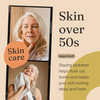
Skin Care After the Age of 50: Nurturing Your Natural Glow
, by Paul Walker, 3 min reading time

, by Paul Walker, 3 min reading time
As we age, our skin undergoes natural changes that require special care and attention. After the age of 50, skin tends to lose elasticity, moisture, and resilience, making it essential to adopt a skincare routine that supports its evolving needs. Here’s a guide to understanding and nurturing your skin so it stays healthy and radiant in your golden years.
Decreased Collagen Production
Collagen is a protein responsible for skin elasticity. As its production slows with age, the skin becomes thinner and more prone to wrinkles and sagging.
Reduced Oil Production
The sebaceous glands produce less oil after 50, leading to drier skin. Hormonal changes, such as those during menopause, further exacerbate this condition.
Slower Skin Renewal
Skin cell turnover slows with age, resulting in a dull appearance and uneven texture.
Sun Damage and Hyperpigmentation
Years of exposure to UV rays may manifest as dark spots, fine lines, or uneven pigmentation.
Use a mild, hydrating cleanser that doesn’t strip your skin of natural oils. Ingredients like glycerin, ceramides, and aloe vera are excellent for maintaining a balanced skin barrier. Avoid harsh soaps and foaming cleansers, which can worsen dryness.
Mature skin needs an added boost of moisture. Opt for products with:
Layering products like hydrating serums and nourishing creams can seal moisture into your skin effectively.
Retinol stimulates collagen production and accelerates cell turnover, reducing the appearance of fine lines and wrinkles. If you’re new to retinol, start with a low concentration and apply it every other night to avoid irritation.
Sunscreen remains a must. Choose a broad-spectrum SPF 30 or higher, and reapply as needed. Sunscreen prevents further damage and reduces the risk of age spots and skin cancers. Look for formulas with added antioxidants for an extra layer of protection.
Oils like jojoba, almond, and rosehip provide additional nourishment for mature skin, particularly when dryness is pronounced. Apply them at night or mix a few drops into your moisturizer.
Ingredients like Vitamin C, kojic acid, and licorice root extract can lighten dark spots over time. Regular exfoliation using alpha hydroxy acids (AHAs) helps remove dead skin cells, improving texture and tone.
These areas often show signs of aging early. Extend your skincare products to your neck, décolletage, and hands to keep these areas looking youthful.
Drink plenty of water to maintain skin elasticity and flush out toxins.
A nutrient-rich diet with antioxidants (berries, spinach, nuts) and omega-3 fatty acids (salmon, walnuts) promotes glowing skin.
Poor sleep accelerates skin aging, so aim for 7-8 hours nightly.
Stress triggers inflammation, which can affect the skin. Practice yoga, meditation, or other stress-reducing activities.
Both dry out the skin and impair collagen production, accelerating signs of aging.
Consult a dermatologist if you have specific concerns like severe dryness, deep wrinkles, or persistent pigmentation. Treatments like chemical peels, laser therapy, or fillers can provide additional solutions tailored to your skin’s needs.
Skin care after 50 doesn’t have to be complicated—it simply needs consistency and the right products. By paying close attention to hydration, nourishment, and protection, you can maintain a healthy glow and feel confident in your skin’s natural beauty. Age is just a number, and great skin is timeless!